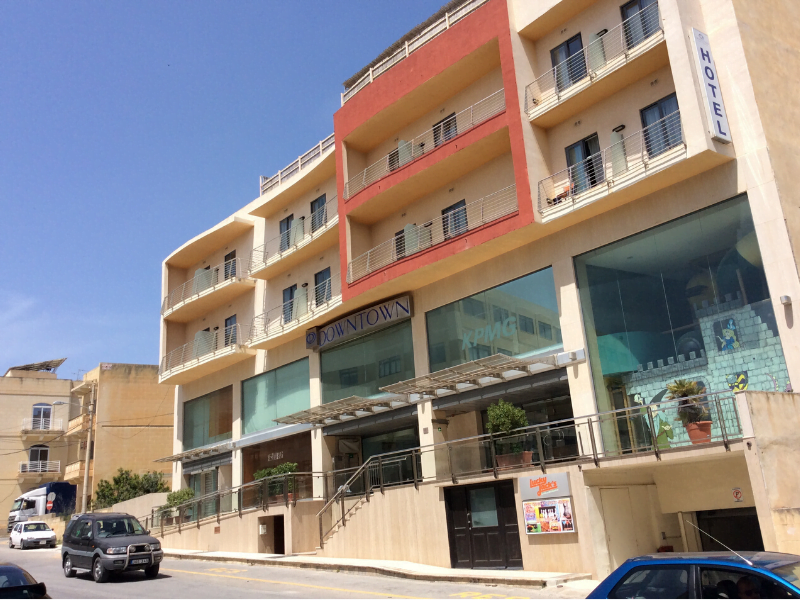A few years ago Barts medical school abandoned an idea to place around 40 medical students in Downtown Hotel after the building’s fire escape was deemed inadequate, according to sources who spoke to The Shift.
They explained that in the scholastic year of 2017-2018, Barts medical school students were moved out of their ordinary residence so that fire suppression systems could be installed. The school management then expressed an interest in temporarily accommodating the students at Downtown Hotel – seen as a good choice due to its location just down the street from students’ classrooms – but then decided to look elsewhere due to the building’s fire safety standards.
The hotel has been in the news since more than 70 elderly patients were relocated there from the Gozo hospital’s St Anne’s Residence so that it could be repurposed for potential coronavirus patients.
Media revelations on the deal with Downtown Hotel, in which the government is paying €54.79 per bed space daily, has generated uproar in Gozo amid complaints by relatives of elderly patients about the premises’ cramped conditions.
Particular concern was expressed about what was deemed as an inadequate fire escape. Architectural drawings of the two floors on which the hotel’s 38 rooms are situated show one staircase, situated towards one of the corners of the building, which serves as a fire escape. The development permit for the hotel was granted in 2004.
Although Barts’ assessment indicates that Downtown Hotel is thought to have particular fire escape vulnerabilities – Barts did find another building that was more acceptable – industry sources maintain that fire safety standards in buildings in Malta also generally fall short of EU or UK standards.
The National Minimum Standards for Care Homes for Older People, published by the Department of Active Ageing, pegs “fire precautions” to a law dating back to 2002 that has been described as outdated by leading industry sources. In an article on The Times of Malta in 2017, a leading industry figure mentioned elderly homes as a main concern due to the elderly patients’ limited mobility.
A spokesperson for Steward Health Care described the hospital’s St Anne’s Residence – where the patients are ordinarily housed before their relocation – as more of a “geriatric hospital”. He said, “patients have a higher dependency and more co-morbidities than expected in a standard nursing home”.
SCSA mum on conditions and recommendations
The Social Care Standards Authority (SCSA), which granted the “emergency licence” to Steward Health Care to relocate the patients did not answer any of the specific questions sent via email, including questions on fire safety standards.
Instead, the Authority sent a letter to The Shift with a demand for it to be published under the legal terms of a Right of Reply. The letter bore the name of CEO Matthew Vella.
The letter referred to an article published on 5 May and makes the point that a “distinction needs to be made” between a licence issued for elderly homes based on the law that regulates the SCSA and an emergency licence pursuant to Legal Notice 74 of 2020 published on 24 March.
The letter explained that the Authority “received an application from Steward Health Care for an emergency licence, in order to transfer the patients from St Anne ward at Gozo General Hospital into a community-based setting, due to the COVID-19 pandemic”.
The “emergency licence” was granted due to the “exceptional circumstances brought about by the same pandemic,” the Authority added. The article to which the Authority referred did in fact mention the context and law in which the emergency licence was granted.
Yet the main thrust of that article was to probe the relocation to Downtown Hotel in the context of alternative premises, Lourdes Home, described as “ideal” but which, judging from answers given by the Gozo Ministry, was not even considered. (Interestingly, while the SCSA said that the emergency licence was granted to Steward Health Care, it was the permanent secretary of the Gozo Ministry who signed the contract with Downtown Hotel.)
The comparison with Lourdes Home is apt because sources say it has been built in conformity with the measures published in the national minimum standards. Downtown, on the other hand, does not meet several of the key policies.
Lourdes Home, which currently lies empty, is also built on land granted on emphyteusis to the Dominican Nuns by parliament in 2016 on condition that it would be used exclusively for “philanthropic and religious uses”. Moreover, according to government sources, discussions had been held between the Dominican Nuns and the Gozo Ministry during Justyne Caruana’s tenure, to open Lourdes Home as an elderly home under a Public Private Partnership agreement.
The Mother Superior of the Dominican Nuns did not deny that these discussions had taken place.
Authority mum on recommendations after its investigation
In its letter to The Shift, the SCSA also emphasised that the “emergency licence” it granted to Steward Heath Care “contains a number of conditions.”
Asked to specify those conditions, a spokesperson for the SCSA wrote that the Authority “will go through your other queries” once the letter is published as a Right of Reply (that is, untouched and uncontested and given the same prominence as the original article).
These “other queries” that have yet to be answered dealt with several issues. One question The Shift sent The Authority asked whether it was acceptable to the SCSA that some of the internal rooms have no windows.
Another asked about beds in some of the rooms positioned along the wall, which would go against one of the measures in the minimum standards that specifies, “layout options shall ensure that there is room on either side of the bed, to enable access for carers and any equipment needed.”
Chris Galea, who is active in a charity focused on elderly care in Gozo, also raised this point when contacted by The Shift. He explained that beds placed alongside the wall might affect the carers’ ability to use the lifter because it may not be possible for it to manoeuvre under the bed. The lifter is an apparatus that hoists weak or bedridden patients out of bed.
Galea spoke to The Shift after the SCSA concluded an investigation in response to an article in The Times of Malta. The SCSA had said in a statement on 26 April that its investigation (into its own decision) had shown that “the residents’ hoists are being used in the rooms when necessary”. The SCSA did not answer questions on whether the lifter could be used in all of the rooms.
The SCSA also did not say whether one of the recommendations it had made following its investigation – that residents are given “a structured programme of varied activities based on the identified needs of the individual” – was being implemented.
Less dependent elderly left in male ward
Enquiries by The Shift have also found that some of the elderly patients who were at St Anne’s Residence, all female, were transferred to the male ward at the Gozo General Hospital.
Asked about the criteria used to decide who was sent to Downtown Hotel and who got to stay at the hospital’s male ward, a spokesperson for Steward Health Care replied that “patient selection was based on Barthel scoring, which is the index used as a standard in elderly homes”.
The Barthel scoring assigns scores based on dependency. Steward did not reply to an additional question on whether it was the least-dependent or the most-dependent of patients who were left at the hospital. Neither did it confirm information from sources that it was eight patients left at the hospital.
The Shift has managed to identify two of the patients among those at the hospital. They are among the more independent former patients of St Anne’s Residence.












